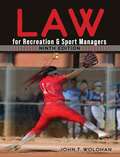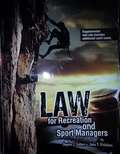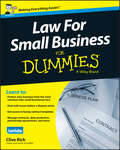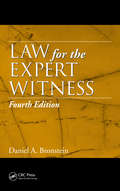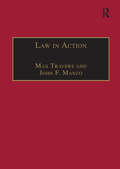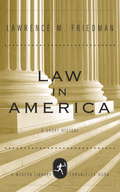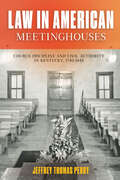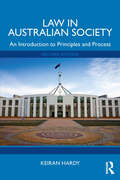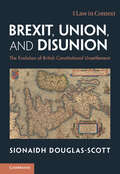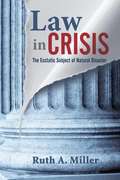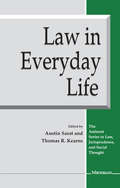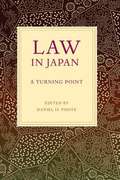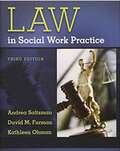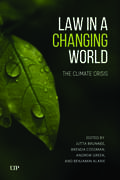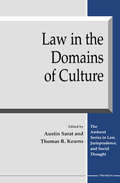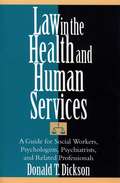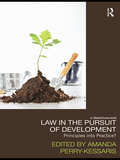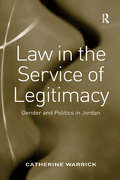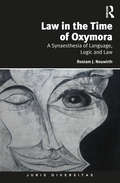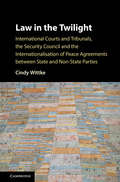- Table View
- List View
Law for Recreation and Sport Managers
by John WolohanSince 1997, Law for Recreation and Sport Managers has been the leading recreation and sports law book for undergraduate and graduate sport management and recreation programs. Key Features: Up-to-date on current court cases Each chapter is written by leading recreation and sport law professors and experts in the field. Each chapter follows an easy-to-read format. Each chapter examines a significant case and reviews how the courts apply the fundamental legal concepts. Designed for both undergraduate and graduate students, the book is divided into seven approachable sections plus additional materials that educates readers on the complex issues of recreation and sport law. Also included: Supplemental cases online – In addition to the significant cases in each chapter, students can now access additional select cases online to further illustrate important concepts. Chapter sidebars - Each chapter now includes a sidebar, an interesting point of law or a new ruling that presents a new idea. End of chapter reviews - Students are encouraged to engage with the material by answering the end of chapter question prompts.
Law for Recreation and Sport Managers (Sixth Edition)
by John T. Wolohan Doyice J. CottenThe Best-Selling Sports Law Book Just Got Better
Law for Recreation and Sports Managers, 3rd Edition
by Doyice J. Cotton John T. WolohanWe desire that Law for Recreation and Sport Managers be as up-to-date as possible. With this in mind, the third edition contains several new chapters on timely topics .
Law for Small Business For Dummies - UK
by Clive RichYour own in-house legal advisor—at a fraction of the cost Written in plain-English for business people without any legal training, Law For Small Business For Dummies covers everything you need to be aware of regarding the law when you're starting and running your own business. Cutting through the jargon that can make even the pros scratch their heads, this book quickly gets you up-to-speed on the key areas of business law, including contracts, websites, intellectual property, data protection and partnership agreements. Plus, you'll find out how small business law applies to advertising and marketing, confidentiality agreements, the sale and supply of goods (including e-commerce), negligence and product liability. There were 526,000 new businesses registered in the UK in 2013—and, at some point, all of them will be faced with legal risks that could make the difference between success and failure. One claim could wipe out a fledgling business' profits, and hit even big businesses harder than they could ever imagine. If you're the owner of a new business and need to get a handle on the ins and outs of small business law—and don't have the budget to employ an in-house legal advisor—this trusted, approachable guide is your answer. Covers the laws surrounding the most common risks small businesses face Addresses how to deal with legal issues before a potentially costly dispute arises Provides access to handy sample contract templates on Dummies.com Serves as your own in-house legal advisor—at a fraction of the cost If you're an existing business owner or an aspiring entrepreneur thinking about starting your own business, Law For Small Business For Dummies gives you answers to questions you didn't even know to ask!
Law for Student Police Officers (Practical Policing Skills Series)
by Jonathan MerrittThis book provides a comprehensive examination of all the required areas of criminal and policing law, with explicit links to the National Occupational Standards. Chapters open with clear objectives and include regular revision notes, knowledge check questions and answers and practical activities. This second edition has been fully revised to expand the content, take account of recent changes and reflect the latest legislation. In particular there is a new chapter on PCSOs, the sections on police powers, roads policing, animals and evidence have been updated and the issue of diversity has been woven into an increased number of scenarios.
Law for the Construction Industry (Chartered Institute of Building)
by Stephanie Owen J.R. LewisLaw for the Construction Industry provides a comprehensive introduction to the English legal system and basic contract law for those involved in the construction industry. It covers the level 2 module on legal studies of The CIOB's Education Framework and is officially sanctioned by The CIOB as the recognised book for that module. The book assumes no previous knowledge of English law.The second edition has been brought fully up-to-date with the latest legal changes. It explains basic contract law and gives the reader an understanding of employment and consumer law whilst placing law in the context of the construction industry throughout.Law for the Construction Industry is a core textbook for the CIOB level 2 module on legal studies, as well as BTEC HNC/D and degree courses in building and construction management.
Law for the Expert Witness
by Daniel A. BronsteinExtensively updated and expanded to incorporate legislative and practical changes enacted since the publication of the previous edition, Law for the Expert Witness, Fourth Edition is designed for professionals and students requiring edification on the current processes and techniques of legal procedure.Drawn from revised versions of the readings as
Law in Action: Ethnomethodological and Conversation Analytic Approaches to Law (Socio-Legal Studies)
by Max Travers John F. ManzoEthnomethodologists and Conversation Analysts have always been interested in the study of law and legal institutions and there is now a large body of empirical studies, representing a range of analytic traditions in each field. This collection introduces this literature and the research questions pursued by ethnomethodologists and conversation analysts, in an accessible form to a general audience in the inter-disciplinary field of law and society studies.
Law in America: A Short History (Modern Library Chronicles #Vol. 10)
by Lawrence M. FriedmanThroughout America's history, our laws have been a reflection of who we are, of what we value, of who has control. They embody our society's genetic code. In the masterful hands of the subject's greatest living historian, the story of the evolution of our laws serves to lay bare the deciding struggles over power and justice that have shaped this country from its birth pangs to the present. Law in Americais a supreme example of the historian's art, its brevity a testament to the great elegance and wit of its composition. From the Hardcover edition.
Law in American Meetinghouses: Church Discipline and Civil Authority in Kentucky, 1780–1845
by Jeffrey Thomas PerryA revealing look at the changing role of churches in the decades after the American Revolution.Most Americans today would not think of their local church as a site for arbitration and would probably be hesitant to bring their property disputes, moral failings, or personal squabbles to their kin and neighbors for judgment. But from the Revolutionary Era through the mid-nineteenth century, many Protestants imbued local churches with immense authority. Through their ritual practice of discipline, churches insisted that brethren refrain from suing each other before "infidels" at local courts and claimed jurisdiction over a range of disputes: not only moral issues such as swearing, drunkenness, and adultery but also matters more typically considered to be under the purview of common law and courts of equity, including disputes over trespass, land, probate, slave warranty, and theft. In Law in American Meetinghouses, Jeffrey Thomas Perry explores the ways that ordinary Americans—Black and white, enslaved and free—understood and created law in their local communities, uncovering a vibrant marketplace of authority in which church meetinghouses played a central role in maintaining their neighborhoods' social peace. Churches were once prominent sites for the creation of local law and in this period were a primary arena in which civil and religious authority collided and shaped one another. When church discipline failed, the wronged parties often pushed back, and their responses highlight the various forces that ultimately hindered that venue's ability to effectively arbitrate disputes between members. Relying primarily on a deep reading of church records and civil case files, Perry examines how legal transformations, an expanding market economy, and religious controversy led churchgoers to reimagine their congregations' authority. By the 1830s, unable to resolve doctrinal quibbles within the fellowship, church factions turned to state courts to secure control over their meetinghouses, often demanding that judges wade into messy ecclesiastical disputes. Tracking changes in disciplinary rigor in Kentucky Baptist churches from that state's frontier period through 1845, and looking beyond statutes and court decrees, Law in American Meetinghouses is a fresh take on church-state relations. Ultimately, it highlights an oft-forgotten way that Americans subtly repositioned religious institutions alongside state authority.
Law in Australian Society: An Introduction to Principles and Process
by Keiran HardyWhat is the ‘rule of law'? How do laws get made? Does our legal and political system achieve justice for all Australians equally? Designed for beginners as well as non-law students, this textbook provides a comprehensive and accessible guide to understanding Australia's system of law and government.Law in Australian Society explains legislation and case law, courts, and the doctrine of precedent. Keiran Hardy examines the roles played by parliaments, politics, and the media. He explains founding principles, including democracy, liberalism, the separation of powers, and federalism. Human rights and justice are highlighted, with an emphasis on First Nations Peoples and the law. The book explains criminal responsibility and the justice system, including police powers and the criminal trial. It concludes with case studies of cybercrime and counterterrorism laws to illustrate law reform in action. This second edition has been fully updated throughout, including recent legislation, cases, and topical issues from Australian law and politics, including from the COVID-19 pandemic and the recent referendum on an Indigenous Voice to Parliament. Each chapter features practical examples, chapter summaries and review questions together with a glossary of key terms. Concise, accessible and up-to-the-minute, this is a vital guide for anyone seeking to understand Australian law and government.
Law in Context: The Evolution Of British Constitutional Unsettlement (Law In Context Ser.)
by Sionaidh Douglas-ScottLaw in Crisis
by Ruth MillerTaking natural disaster as the political and legal norm is uncommon. Taking a person who has become unstable and irrational during a disaster as the starting point for legal analysis is equally uncommon. Nonetheless, in Law in Crisis Ruth Miller makes the unsettling case that the law demands an ecstatic subject and that natural disaster is the endpoint to law. Developing an idiosyncratic but compelling new theory of legal and political existence, Miller challenges existing arguments that, whether valedictory or critical, have posited the rational, bounded self as the normative subject of law. By bringing a distinctive, accessible reading of contemporary political philosophy to bear on source material in several European and Middle Eastern languages, Miller constructs a cogent analysis of natural disaster and its role in modern subject formation. In the process, she opens up exciting new lines of inquiry in the fields of law, politics, and gender studies. Law in Crisis represents a promising new development in the interdisciplinary study of law.
Law in Everyday Japan: Sex, Sumo, Suicide, and Statutes
by Mark D. WestLawsuits are rare events in most people's lives. High-stakes cases are even less commonplace. Why is it, then, that scholarship about the Japanese legal system has focused almost exclusively on epic court battles, large-scale social issues, and corporate governance? Mark D. West's Law in Everyday Japan fills a void in our understanding of the relationship between law and social life in Japan by shifting the focus to cases more representative of everyday Japanese life. Compiling case studies based on seven fascinating themes—karaoke-based noise complaints, sumo wrestling, love hotels, post-Kobe earthquake condominium reconstruction, lost-and-found outcomes, working hours, and debt-induced suicide—Law in Everyday Japan offers a vibrant portrait of the way law intermingles with social norms, historically ingrained ideas, and cultural mores in Japan. Each example is informed by extensive fieldwork. West interviews all of the participants-from judges and lawyers to defendants, plaintiffs, and their families-to uncover an everyday Japan where law matters, albeit in very surprising ways.
Law in Everyday Life
by Austin Sarat Thomas R. KearnsThe subject of law in everyday life is timely in theory and in practice. The essays collected here are stimulating for the very different ways in which they reconfigure the meanings of 'the law' as cultural practice, and 'the everyday' as a cultural domain in which the state expresses a range of interests and engagements. Readers looking for an introduction to this topic will come away from the book with a clear sense of the varied voices and modes of inquiry now involved in sociolegal studies, and what distinguishes them. More experienced readers will appreciate the book's meticulous reconsideration of the instrumentalities, agencies, and constructedness of law.
Law in Japan: A Turning Point (Asian Law Series #No.19)
by Daniel H. FooteThis volume explores major developments in Japanese law over the latter half of the twentieth century and looks ahead to the future. <P><P> It features the work of thirty-five leading legal experts on most of the major fields of Japanese law, with special attention to the increasingly important areas of environmental law, health law, intellectual property, and insolvency.
Law in Social Work Practice
by Andrea Saltzman David M. Furman Kathleen OhmanWritten by an author team educated in both the law and social work, this book acquaints readers with major state and federal laws, regulations, and court opinions that directly affect social work practice. <p><p>LAW IN SOCIAL WORK PRACTICE, 3rd Edition helps readers understand how to work within the legal system to benefit clients and further client interests, recognize certain client problems as legal, and work effectively with lawyers, as well as how the law shapes and restricts clients' actions. It also addresses how the law regulates social work practice, and how to recognize and respect the rights of clients and others affected by a practitioner's actions.
Law in a Changing World: The Climate Crisis
by Andrew Green Brenda Cossman Benjamin Alarie Jutta BrunneeLaw in a Changing World explores how climate change is reshaping the law, drawing on contributions from legal scholars across diverse fields. The book examines how climate change impacts areas such as governance, justice, housing, and disability law. Rather than focusing on climate law alone, the chapters explore how climate change is challenging foundational legal concepts and demanding adaptations across various sectors.The authors consider the roles of international, Indigenous, and domestic legal systems in addressing climate-related issues. Topics include climate justice for vulnerable populations, the role of government in crisis management, and the intersection of law with emerging challenges like housing and disability rights. Law in a Changing World provides a comprehensive, cross-disciplinary examination of how legal frameworks can respond to climate-related emergencies and injustices, offering fresh perspectives on the role of law in a warming world. It is an essential read for those interested in the intersection of law, policy, and climate change.
Law in a Market Context
by Robin Paul MalloyIn Law in a Market Context Robin Paul Malloy examines the way in which people, as social beings, experience the intersection of law, markets, and culture. His work recognizes that experience varies by such characteristics as culture, race, gender, age, and class, among others. Thus, market analysis must account for these variations. Through case examples, illustrative fact patterns, and problems based on hypothetical situations he demonstrates the implications and the ambiguities of law in a market society. In his analysis he provides a complete and accessible introduction to a vast array of economic terms, concepts, and ideas - making this book a valuable primer for anyone interested in understanding the use of market concepts in legal reasoning.
Law in the Domains of Culture
by Austin Sarat Thomas R. KearnsThe concept of culture is troublingly vague and, at the same time, hotly contested, and law's relations to culture are as complex, varied and disputed as the concept of culture itself. The concept of the traditional, unified, reified, civilizing idea of culture has come under attack. The growth of cultural studies has played an important role in redefining culture by including popular culture and questions of social stratification, power and social conflict. Law and legal studies are relative latecomers to cultural studies. As scholars have come to see law as not something apart from culture and society, they have begun to explore the connections between law and culture. Focusing on the production, interpretation, consumption and circulation of legal meaning, these scholars suggest that law is inseparable from the interests, goals and understandings that deeply shape or compromise social life. Against this background, Law in the Domains of Culture brings the insights and approaches of cultural studies to law and tries to secure for law a place in cultural analysis. This book provides a sampling of significant theoretical issues in the cultural analysis of law and illustrates some of those issues in provocative examples of the genre. Law in the Domains of Culture is designed to encourage the still tentative efforts to forge a new interdisciplinary synthesis, cultural studies of law.
Law in the Health and Human Services
by Donald T. DicksonProfessor Dickson provides students with examples of a legal way of thinking about significant issues in social policy. This book can be used in policy and practice courses in the fields of mental health, child welfare, the family, developmental and physical disabilities, and professional ethics. Provides excellent selection of relevant court decisions along with clearly articulated questions and issues for discussion.
Law in the Pursuit of Development: Principles into Practice? (Law, Development and Globalization)
by Amanda Perry KessarisLaw in the Pursuit of Development critically explores the relationships between contemporary principles and practice in law and development. Including papers by internationally renowned, as well as emerging, scholars and practitioners, the book is organized around the three liberal principles which underlie current efforts to direct law towards the pursuit of development. First, that the private sector has an important role to play in promoting the public interest; second, that widespread participation and accountability are essential to any large scale enterprise; and third, that the rule of law is a fundamental building block of development. This insightful and provocative collection, in which contributors critique both the principles and efforts to implement them in practice, will be of considerable interest to students, academics and practitioners with an interest in the fields of law and development, international economic law, and law and globalization.
Law in the Service of Legitimacy: Gender and Politics in Jordan
by Catherine WarrickUsing gender and law in the political system of Jordan as a means of investigating broader issues surrounding the relationship between culture and political legitimacy, this volume offers an in-depth treatment of the laws that define, limit and expand women's rights. Arguing that gender issues aren't simply a 'special topic' in politics, but an indicator and symbol of the character of the political system as a whole, the significance of the politics of legitimacy as played out in issues of gender and law is not only about the content of policies and competition of interests, but about the power to determine the nature of the political system itself.
Law in the Time of Oxymora: A Synaesthesia of Language, Logic and Law (Juris Diversitas)
by Rostam J. NeuwirthWhat do different concepts like true lie, bad luck, honest thief, old news, spacetime, glocalization, symplexity, sustainable development, constant change, soft law, substantive due process, pure law, bureaucratic efficiency and global justice have in common? What connections do they share with innumerable paradoxes, like the ones of happiness, time, globalization, sex, and of free will and fate? Law in the Time of Oxymora provides answers to these conundrums by critically comparing the apparent rise in recent years of the use of rhetorical figures called "essentially oxymoronic concepts" (i.e. oxymoron, enantiosis and paradoxes) in the areas of art, science and law. Albeit to varying degrees, these concepts share the quality of giving expression to apparent contradictions. Through this quality, they also challenge the scientific paradigm rooted in the dualistic thinking and binary logic that is traditionally used in the West, as opposed to the East, where a paradoxical mode of thinking and fuzzy logic is said to have been cultivated. Following a review of oxymora and paradoxes in art and various scientific writings, hundreds of "hard cases" featuring oxymora and a comprehensive review of the legal literature are discussed, revealing evidence suggesting that the present scientific paradigm of dualism alone will no longer be able to tackle the challenges arising from increasing diversity and complexity coupled with an apparent acceleration of change. Law in the Time of Oxymora reaches the surprising conclusion that essentially oxymoronic concepts may inaugurate a new era of cognition, involving the ways the senses interact and how we reason, think and make decisions in law and in life.
Law in the Twilight: International Courts and Tribunals, the Security Council and the Internationalisation of Peace Agreements between State and Non-State Parties
by Cindy WittkeAn informative book focusing on the internationalisation and legalisation of peace agreements to settle intra-state conflicts between state and non-state parties. Cindy Wittke focuses on two key issues: how international courts and tribunals deal with peace agreements; and what implications the United Nations Security Council's involvement in the negotiation and implementation of peace agreements has for the agreements' legal nature, the status of the non-state parties to agreements and the interpretation of peace agreements. Wittke argues that the processes of negotiating and implementing peace agreements between state and non-state parties create new spheres, spaces and forms of post-conflict law making and law enforcement. For example, contemporary peace agreements can simultaneously take the form and function of internationalised transitional constitutions and agreements governed by international law. The resulting characteristics of contemporary peace agreement lead to permanent ambiguities shaping their interpretation and enforcement.
